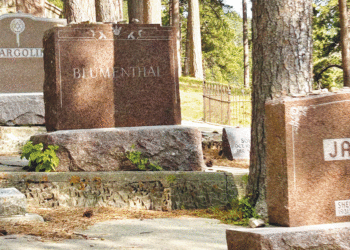Two weeks ago, protesters gathered in south Minneapolis, outside of the Burger King at 34th Street and Nicollet Avenue. The demonstration was called to support fast food workers seeking a livable wage. Then a group split off from Burger King and headed to the I-35W freeway, where the focus of outrage became the refusal of grand juries in New York and Ferguson, Mo., to indict the police officers who recently killed young black men in street confrontations.
The protesters shut down the northbound lanes of I-35W for more than an hour, as they walked all the way downtown from 35th Street.
“Protesters were heard chanting ‘I can’t breathe,’ reportedly the last words of Eric Garner, who was subdued in a chokehold by New York City police. It’s become a rallying cry for those protesting police brutality,” reported Minnesota Public Radio.
The demonstration gained widespread local press attention, and engendered a discussion about policing, vis-à-vis the decision to let the protest proceed (with a Minnesota Highway Patrol escort), although a great many folks were inconvenienced by the shutdown of a major traffic artery.
The demonstration in Minneapolis (and another last Saturday that drew more than 500 mainly young people to the Hennepin County Government Center and downtown streets) was part of a nationwide upsurge of voices seeking social justice in the face of police shootings of unarmed blacks. The police shootings of Michael Brown in Ferguson and the death of Garner in Staten Island, which resulted in no grand jury indictments of the officers involved, are two of the recent incidents that have sparked popular outrage. The hashtag #BlackLivesMatter has become the organizing category for social media publicizing these protests.
Adding fuel to the raging social fire, on Nov. 22, a Cleveland police officer shot 12-year-old Tamir Rice, who had a replica pistol in his possession. The police shooting of Rice is reportedly under investigation. (And on Aug. 5, John Crawford III, a 22-year-old black man, was shot to death by police in a Wal-Mart, in Beavercreek, Ohio, near Dayton, following a phoned-in report that a man was pointing a rifle at shoppers. Crawford had picked up a BB gun in the store.)
The shocking number of police shootings of unarmed blacks belies the popular notion of the U.S. becoming a “post-racial society,” following the election of Barack Obama as president in 2008. While “white people” generally don’t see a racial dimension to most social problems, African Americans are terrified that their children will be killed by cops.
Perusing Facebook recently, I came upon an ABC-TV Nightline segment with Lawrence Otis Graham, who explained how he and his wife have enforced a strict dress code for their sons, in the interest of protecting them from police profiling, or worse.
Graham, impeccably dressed in his luxuriously furnished home, introduces himself as an attorney, and a graduate of Princeton University and Harvard Law School. His wife, an investment banker, “went to Harvard College, Harvard Law School, Harvard Business School.” The couple have three children, a girl and two boys.
In order to prevent his sons from wearing clothes that could lead to their being perceived as being part of the “criminal element” in society, they are not allowed to wear dark clothes or hoodies. Trayvon Martin famously was wearing a hoodie, when he was stalked and killed by a security guard.
“That could have been our own sons,” comments Graham.
In addition, Graham’s sons are instructed not to carry anything in their hands at night “that could be misconstrued as a weapon.” And so on.
“My biggest fear for my black boys is just, I don’t want them shot, I don’t want them tasered,” Graham concludes. “I want to keep them alive.”
Again, in America’s charged racial climate, parents with black sons are fearful every time their children venture out in public. This is the reality of race relations in our society.
In the face of this dismal situation, Bend the Arc, a national Jewish social justice group, called on Jews to dedicate the first night of the Festival of Lights to #ChanukahAction: A Jewish Day of Action to End Police Violence. Beyond the symbolic action of adding the hashtag #BlackLivesMatter to your hanukia, Bend the Arc has called for “swift and major reforms, including the demilitarization of local law enforcement, the publication of data relating to racially biased policing, and the passage of the End Racial Profiling Act.”
There are myriad social problems in the United States; but the recent social justice movement that has taken to the streets of American cities from Oakland to New York, and from Minneapolis to Ferguson, should be a topic of discussion in our synagogues, and wherever we gather. Fifty years ago, Jews were at the forefront of the Civil Rights movement, which overthrew the Jim Crow system in the South, and fought discriminatory racial practices across the country. In 2015, Jews should dedicate themselves to the new movement for social justice.
The editors and staff of the American Jewish World wish our readers Happy Hanuka!
— Mordecai Specktor / editor@ajwnews.com
(American Jewish World, 12.19.14)



















